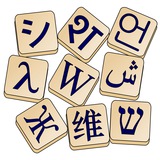✳ knock (verb)
Forms:
- knocks (present, singular, third-person)
- knocking (participle, present)
- knocked (participle, past)
- knocked (past)
- en-conj-simple (inflection-template)
- knock (infinitive)
knock (verb) senses:
1. (transitive, dated) To strike for admittance; to rap upon, as a door.
2. (transitive, colloquial) To criticize verbally; to denigrate; to undervalue.
3. (transitive, soccer) To kick a ball towards another player; to pass.
...
Forms:
- knocks (present, singular, third-person)
- knocking (participle, present)
- knocked (participle, past)
- knocked (past)
- en-conj-simple (inflection-template)
- knock (infinitive)
knock (verb) senses:
1. (transitive, dated) To strike for admittance; to rap upon, as a door.
2. (transitive, colloquial) To criticize verbally; to denigrate; to undervalue.
3. (transitive, soccer) To kick a ball towards another player; to pass.
...
🌜 Present Perfect Continuous 🌛
They have been collaborating with international partners.
They have been collaborating with international partners.
🗣 Conversation 🗣
- Good evening! I don't believe we've met before. May I introduce myself? My name is Jack.
- It's a pleasure to meet you. My name is Lucy.
- I'm very happy to meet you. You're from the United States, aren't you?
- Yes, I'm from Salt Lake City.
- I've been to Salt Lake City a few times. I really like your city.
- I'm glad to hear that. I think it's the nicest city in the United States.
- Good evening! I don't believe we've met before. May I introduce myself? My name is Jack.
- It's a pleasure to meet you. My name is Lucy.
- I'm very happy to meet you. You're from the United States, aren't you?
- Yes, I'm from Salt Lake City.
- I've been to Salt Lake City a few times. I really like your city.
- I'm glad to hear that. I think it's the nicest city in the United States.
💡 Example 💡 complementologist
complementologist (noun): For this reason, as explained below, complementologist colleagues with neologist vein might find substantial reason to consider updating this deeply rooted misnomer.
Ask @wikt_en_bot for 'complementologist'
complementologist (noun): For this reason, as explained below, complementologist colleagues with neologist vein might find substantial reason to consider updating this deeply rooted misnomer.
Ask @wikt_en_bot for 'complementologist'
✳ disaster (noun)
Sounds:
- /dɪˈzæs.tɚ/ (US)
- /dɪˈzɑːs.tə(ɹ)/ (Received-Pronunciation)
- /dɪˈzæs.tə/ (Northern-England)
Forms:
- disasters (plural)
disaster (noun) senses:
1. An unexpected natural or man-made catastrophe of substantial extent causing significant physical damage or destruction, loss of life or sometimes permanent change to the natural environment.
2. An unforeseen event causing great loss, upset or unpleasantness of whatever kind.
Sounds:
- /dɪˈzæs.tɚ/ (US)
- /dɪˈzɑːs.tə(ɹ)/ (Received-Pronunciation)
- /dɪˈzæs.tə/ (Northern-England)
Forms:
- disasters (plural)
disaster (noun) senses:
1. An unexpected natural or man-made catastrophe of substantial extent causing significant physical damage or destruction, loss of life or sometimes permanent change to the natural environment.
2. An unforeseen event causing great loss, upset or unpleasantness of whatever kind.
See more about 'disaster' in Wiktionary. Ask @wikt_en_bot for another word.
💡 Example 💡 Muskian
Muskian (adj): Together, the essays in this volume seek to assemble withdrawal as a concept that, in turn, may help us to identify, regroup, and understand apparently diverging political and socio-cultural phenomena ranging from[…]to the Trumpian/Muskian fantasies of intergalactic colonization disenchanted by Sharma in the coda to this book.
Ask @wikt_en_bot for 'Muskian'
Muskian (adj): Together, the essays in this volume seek to assemble withdrawal as a concept that, in turn, may help us to identify, regroup, and understand apparently diverging political and socio-cultural phenomena ranging from[…]to the Trumpian/Muskian fantasies of intergalactic colonization disenchanted by Sharma in the coda to this book.
Ask @wikt_en_bot for 'Muskian'
✳ glass (noun)
Sounds:
- /ɡlɑːs/
- [ɡlɑːs] (Received-Pronunciation)
- [ɡläːs] (General-Australian, New-Zealand)
- [ɡlɐːs] (General-Australian, New-Zealand)
- /ɡlæs/
- [ɡlæs] (Canada, US)
- [ɡlɛəs] (Canada, US)
- [ɡleəs] (Canada, US)
- [ɡlas] (Ireland, Northern-England)
Forms:
- glasses (plural)
glass (noun) senses:
1. (usually uncountable) An amorphous solid, often transparent substance, usually made by melting silica sand with various additives (for most purposes, a mixture of soda, potash and lime is added).
2. (countable, uncountable, by extension) Any amorphous solid (one without a regular crystal lattice).
3. (countable) A vessel from which one drinks, especially one made of glass, plastic, or similar translucent or semi-translucent material.
...
Sounds:
- /ɡlɑːs/
- [ɡlɑːs] (Received-Pronunciation)
- [ɡläːs] (General-Australian, New-Zealand)
- [ɡlɐːs] (General-Australian, New-Zealand)
- /ɡlæs/
- [ɡlæs] (Canada, US)
- [ɡlɛəs] (Canada, US)
- [ɡleəs] (Canada, US)
- [ɡlas] (Ireland, Northern-England)
Forms:
- glasses (plural)
glass (noun) senses:
1. (usually uncountable) An amorphous solid, often transparent substance, usually made by melting silica sand with various additives (for most purposes, a mixture of soda, potash and lime is added).
2. (countable, uncountable, by extension) Any amorphous solid (one without a regular crystal lattice).
3. (countable) A vessel from which one drinks, especially one made of glass, plastic, or similar translucent or semi-translucent material.
...
✳ glass (verb)
Forms:
- glasses (present, singular, third-person)
- glassing (participle, present)
- glassed (participle, past)
- glassed (past)
glass (verb) senses:
1. (transitive) To fit with glass; to glaze.
2. (transitive) To enclose in glass.
3. (transitive) Clipping of fibreglass. To fit, cover, fill, or build, with fibreglass-reinforced resin composite (fibreglass).
...
Forms:
- glasses (present, singular, third-person)
- glassing (participle, present)
- glassed (participle, past)
- glassed (past)
glass (verb) senses:
1. (transitive) To fit with glass; to glaze.
2. (transitive) To enclose in glass.
3. (transitive) Clipping of fibreglass. To fit, cover, fill, or build, with fibreglass-reinforced resin composite (fibreglass).
...
